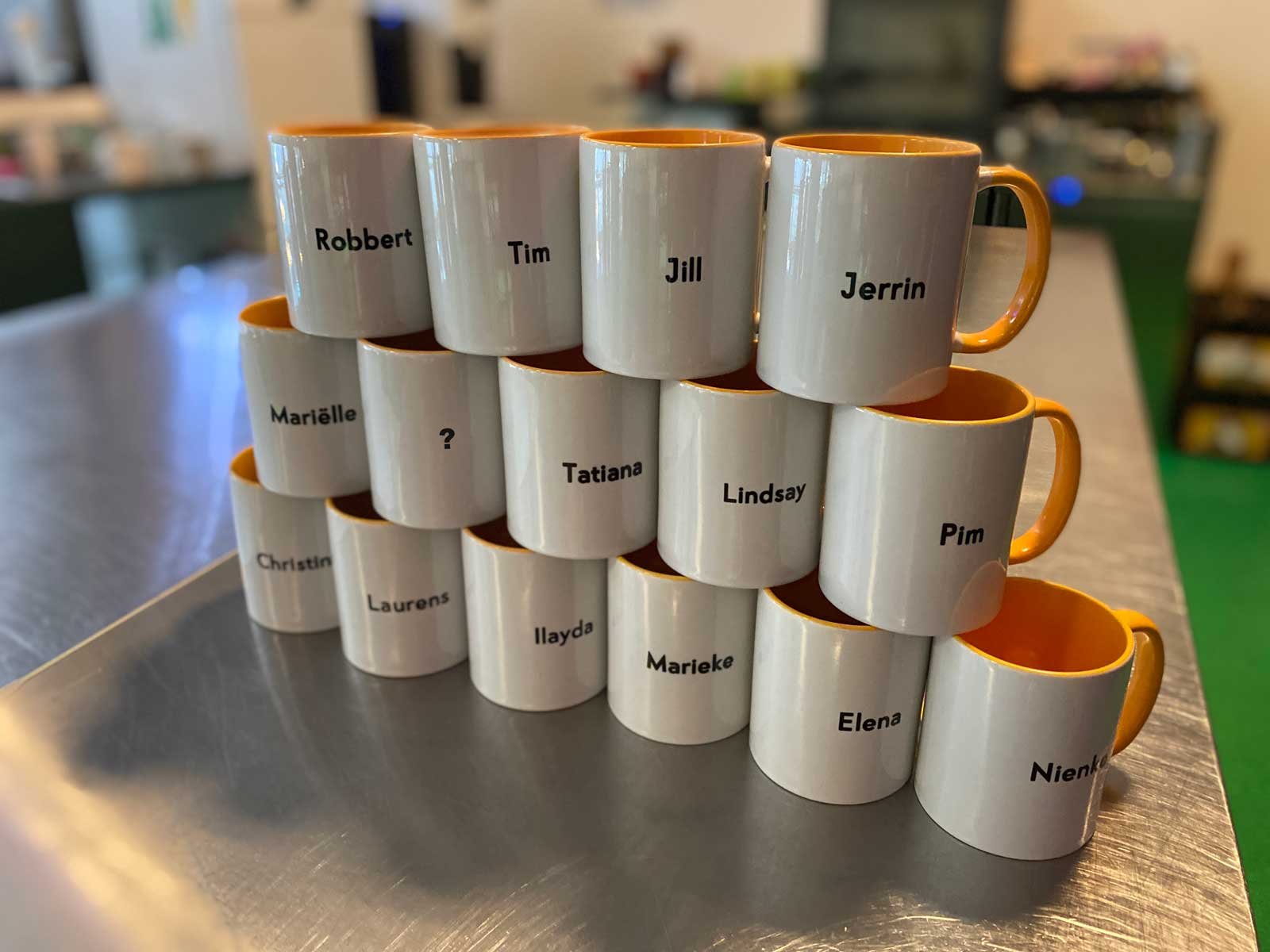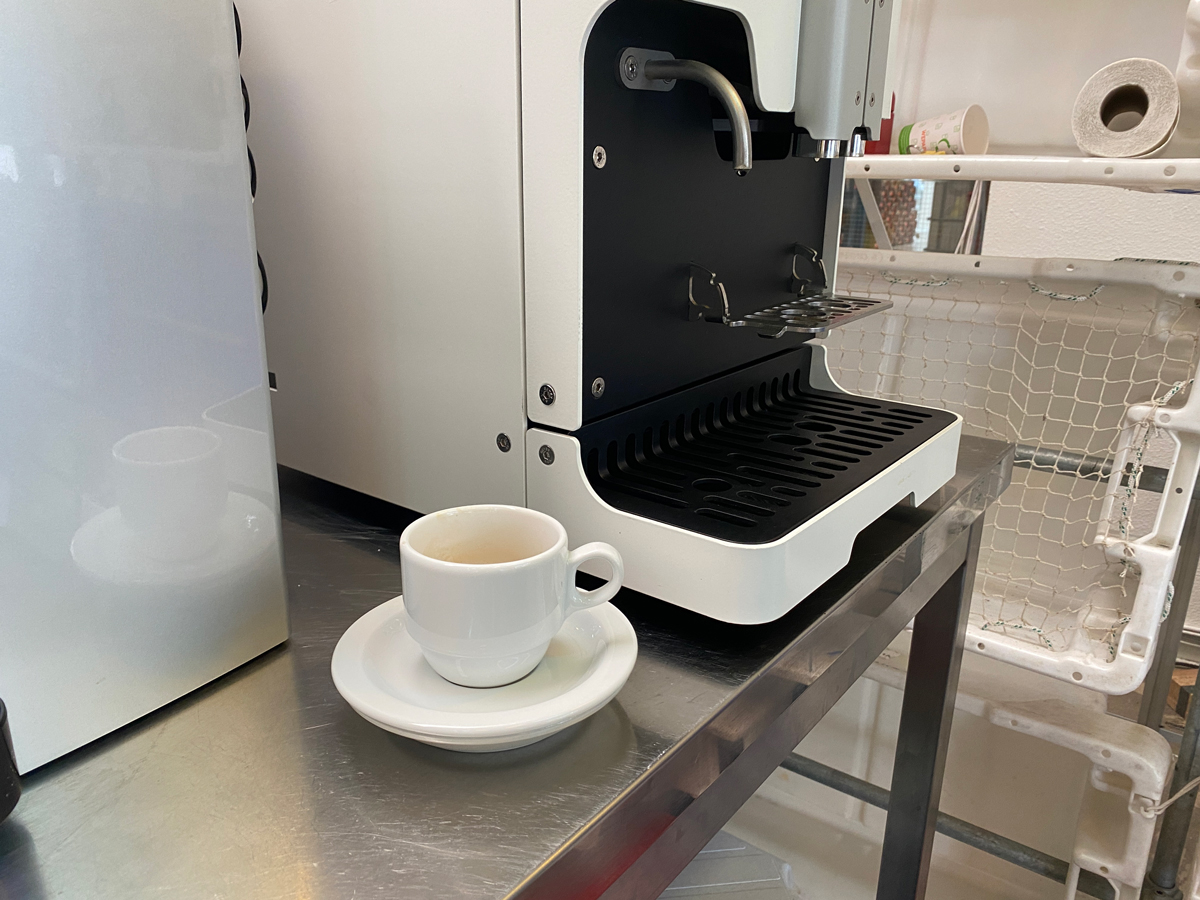Around the world, the workplace runs on it: coffee. It is the fuel that powers our workday and helps to complete our office tasks. But with all the coffee in the office also comes a significant amount of waste: piles and piles of coffee cups! Even more specifically: disposable coffee cups. Because of the plastic coating, your coffee cup may end up in the plastic soup. That's why the government (for now*) requires the reuse of coffee cups in the office, in the shack, canteen, factory or business premises from January 1, 2024.
*Does the legal obligation go into effect?
The obligation is not yet set in stone. A motion was introduced in the House of Representatives to drop this obligation, which has not yet received a response. Given the ongoing formation process, this may take some time. Until there is more clarity, the obligation simply goes into effect. However, the ILT (Inspectorate for the Environment and Transport) will not enforce, but tolerate until further notice. Want to know more about the legislation and how to still choose the best future-proof option? Then read on in our blog.
Where it started: challenges of coffee cups
Since 2017, the European Union has been focusing enormously on reducing Single Use Plastics (SUP), such as coffee cups, cutlery and straws. "Every day we throw away 19 million plastic cups and food packaging in the Netherlands alone, after single use," stated State Secretary Heijnen. "A turnaround is needed from disposable to reuse. Many entrepreneurs are already working well on this. This way we prevent plastic soup, deal more carefully with raw materials and leave behind a cleaner world."
To bring about the needed turnaround, the European Union is enacting new legislation by Jan. 1, 2024:
- For workspaces, reusable dishes, cutlery and cups are the starting point.
- Businesses are required to offer reusable initiatives to their customers.
- Companies must demonstrably recycle or reuse at least 75% by 2024 and 90% by 2027 of the disposable cups purchased in a high quality manner.
Several measures against SUP have already been introduced since 2021. For example, disposable plastic bags are no longer free. And since July 1, 2023, business owners have levied a fee on disposable packaging when consuming on the go. Incidentally, there has been considerable criticism of this from the House of Representatives, the hospitality industry and even environmental organizations. The Environment and Transport Inspectorate (ILT) indicates that the surcharge on disposable packaging is "unenforceable, susceptible to fraud and not easily enforceable."
The European Commission said it takes the criticisms to heart. The Commission will evaluate the directive in the future and adjust it if necessary.
Challenges coffee cup in the workplace
Reusing coffee cups in the workplace is the next step in reducing SUP. This involves three challenges:
- Convenience: the use of disposable coffee cups is often the result of convenience. The cups are readily available, require no cleaning and are easily discarded after use. Reusable coffee cups must be taken out for cleaning on a regular basis. This can be perceived as inconvenient, reducing employees' motivation to switch to reusable coffee cups.
- Culture: in most corporate cultures, disposable coffee cups are the norm. Because reusable cups have never been encouraged, it can be difficult to make a behavioral change. Therefore, reusable cups should be offered as the default choice within every office culture.
- Lack of collection bins: many workplaces lack specialized collection bins for disposable coffee cups. As a result, the cups cannot be widely separated and often end up in the residual waste.
Coffee mugs in the workplace? Here are the options
Because the new legislation focuses on single-use plastic containers, it affects every location where coffee is served. Workplaces such as offices fall under "on-site consumption" in this regard. There, reuse is the new norm. The more often a cup is used, the lower the ecological impact per life cycle.
With reusable coffee cups, emissions occur when the coffee cup is produced and when it is washed. Tips for resource and environmental conservation when reusing coffee cups are therefore:
- Transporting coffee cups to a remote wash location. Milgro has several contacts that offer these services. Want to know more? Feel free to scedule an appointment.
- Invest in reusable cups Buy mugs from a secondhand store or use the ones that are already there.
- Wash these cups in a dishwasher. Check the energy label of the dishwasher, as they are often responsible for many emissions. The more professional the washer, the lower the eco-impact.
- Run the dishwasher on wind or solar power.
- Encourage reuse of the same mug and discourage employees from grabbing a new mug each time. If necessary, rinse the mug with cold water between uses.
Why are disposable cups not on this list?
There is a limited exception for recycling disposable coffee cups: they may only be recycled at high quality. Yet the disposable cup is not on the list of options for office coffee cups. That's because high-quality recycling is not a simple process.
What is high-value recycling?
We speak of high-quality recycling when coffee cups can be recycled into new packaging material for the food industry. The Dutch Food and Consumer Product Safety Authority sets strict standards for materials that come into contact with food. For example, food packaging must ensure consumer safety and prevent hazardous substances from entering food.
The new SUP law means that plastic-coated cardboard cups no longer meet this requirement. These cups are traditionally processed into paper pulp for hygiene paper.
Enforcement
Enforcement of the SUP law is carried out by the ILT, which can impose penalty payments. If you want to use cups that require high-value processing, you must first request permission from the ILT. In exceptional cases, permission will be granted. You also need to keep conclusive records about purchase quantities and recycled cups.
Finally, it is also important to inform your people about the proper way to recycle. Neat collection means: do not put stirrers, napkins, apple cores and other residual waste in the disposable cups. Are the coffee cups too contaminated anyway? Then there is no high-quality recycling and all the waste still goes into the incinerator.
Impact mug versus disposable
You may be wondering how many times a coffee cup must be reused before it has a lower climate impact than a disposable cup. The answer to this question has been the subject of much research. For example, a meta-analysis was commissioned by UNEP and the Life Cycle Initiative in 2021.
The answer was not unequivocal and ranged from 10 to 670 uses. This is because the climate impact depends entirely on the type of material, the end-of-life scenario and the washing method of the cups. However, the study did conclude that a reusable cup, regardless of the type of material, always has a lower climate impact than a disposable coffee cup.
Which material coffee cup should I choose?
Research shows that virgin polypropylene has the lowest environmental impact. The lightweight material requires few resources and can be highly processed. This while cups with recycled source materials, such as coffee husks, are considered less environmentally friendly due to their higher weight and CO2 emissions.
The ins & outs of reusable cups to be returned
- Reusable cups are cheaper than disposable cups over the entire lifetime.
- Polypropylene cups retain flavor and odor compounds, unlike glass or ceramic coffee cups.
- In the long run, washing up reusable coffee cups has a higher CO2 impact. Therefore, it is wise to limit dishwashing as much as possible or outsource it to professional facilities.
- Heavier Polypropylene, glass and ceramic cups are again more likely to be returned to the bar by consumers than lighter PP cups, which are more likely to be discarded.
Criticism of regulations surrounding disposable plastic
The legislation surrounding disposable cups and coffee mugs in the office is causing a stir. The Environmental and Transport Inspectorate (ILT) was found to have issued a negative opinion even before the surcharge was introduced in 2023. Nevertheless, the law was introduced, much to the displeasure of business owners. The House of Representatives was already calling for the surcharge to be abolished, but the outgoing cabinet does not want to comply. At the time of writing, there is a motion to reject the obligation. In case this passes, coffee cups will still be allowed, provided there is a proper collection plan. Also, the definition of "high-quality recycling" will then be changed.
What do we recommend?
Milgro does not believe that stopping these regulations is the solution. We have to go through a period where reuse is accepted as the new norm. And in which the possibilities and limitations of the regulations must be optimized. That takes time. We believe that the laws surrounding SUPs will have a positive effect in the long run. So we also advise our customers to look keenly at sustainable solutions for coffee cups.
How can Milgro help?
Do you want to be well prepared for the new legislation? Then start early with a plan for reusable coffee cups in the office. Milgro is ready to help you do just that:
- Knowledge and advice on a Reuse deposit system to or Washing as a service.
- Do you really have no choice but to use disposable cups? If so, we would be happy to help with high-quality recycling of your coffee cups.
Stay informed
Stay up to date on all new developments? Follow us on LinkedIn or Instagram. Or subscribe to the newsletter. Are you curious about what Milgro can do for your operations and waste process? Contact us















